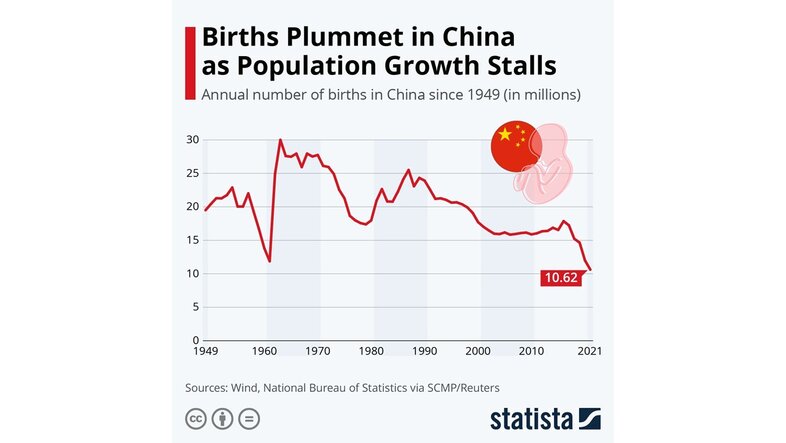Everyone wants women to have more babies, is technology the solution?
Many countries see fertility decline as a national and economic crisis (calling it a "baby crisis", "fertility crisis", or sometimes, a “population collapse"). The reasoning is that a shrinking labour force simply cannot continue to support an aging society. Industries and schools built for a younger or growing society will start to fail.
Pronatalism is thus on the rise, pushing for restrictions, regulations, or welfare to promote a higher national birth rate. Countries after countries are messaging the need for more babies, swinging from the Danish government’s promise to solve the "involuntary childlessness" problem by covering fertility treatment under their public health system to Russia's omnipresent discourse of a "demographic crisis" and Putin’s current legal push to ban so-called "child-free propaganda". In the recent US elections, extreme pronatalist claims about population extinctions and race wars peppered the discourse over reproductive control. The previous scare of global overpopulation has somehow ceded into the background.
Attend Ayo Wahlberg's lecture and masterclass
How do we (try to) live well with our health conditions? Ayo Wahlberg, Professor at the Department of Anthropology of University of Copenhagen, is also well-known for his research on "chronic living." During his research stay at the University of Vienna, he will give a masterclass and lecture at the Department of Social and Cultural Anthropology.
On Wednesday, Nov 20th, 17:00, he will give the Wednesday Seminar on "Surveillance Life – Predisposed in Welfare State Denmark". You can find the announcement flyer and abstract of the talk here (pdf download).
Researchers Veronika Siegl and Sophie Wagner have also organised his masterclass on "Chronic Living", which will place on Friday, Nov 22nd from 13:30 to 16:40. Students and researchers can request a list of readings and register for the class by sending a brief email to the Health Matters research team in advance.
"Going to fertility treatment as the solution is like trying to put a Band-Aid on a much larger issue. To understand issues of fertility, we need to recognise that every nation has a fertility scene".Ayo Wahlberg
Navigating fertility markets requires constant ethical labour
Within the national reproductive complex, a whirlwind of routines, practices, and decisions govern the selective abortion, surrogate matches, or donations to a sperm bank. These structures, argues Wahlberg, shape the intimate experiences of individuals as they seek to navigate the process.
These processes are steeped in moral grey zones. Siegl examines the "intimate labour" Russian and Ukrainian surrogates sign up for when enter the commercial market, a practice deeply associated with moral taboos, illegitimacy, and secrecy.
The highly commercial context provides a distant, "sanitised" trading experience. Siegl recalls an interview with a woman from Russia, who "was just happy that she would get paid and that the clinic took over all the communications. She didn’t have any contact with the parents and didn’t want to." This corresponds with the overall understanding of surrogacy as business relationship, which clearly sets Russia and Ukraine apart from countries such as the US, where altruism and love are common narratives around surrogacy. “While intimate and affective entanglements are deemed dangerous and unethical in the former, financial and economic aspects are considered tainting in the latter," says Siegl.
Different socio-historical contexts impact the way we think about what’s right or wrong about surrogacy. As a result, birthing surrogates and the intended parents invest in what Siegl calls "ethical labour" as they grapple with and counter the moral critiques around them. Battling over the "true" meanings of surrogacy, which are often simplified and shifting, "helps surrogate participants navigate their roles in the reproductive market", explains Siegl, "while on a bigger scale, they ‘lubricate’ the market’s expansion". For instance, in Russia, framing surrogacy as paid work facilitates a neat exchange of money and baby that can then be casted and defended as saving the so-called "traditional family".
Save the date: Nov 21-23, 2024 conference on delayed reproduction
As women push back their timeline to start a family, they come up against the many biological and social constraints that reduce fertility. University of Vienna demographer Éva Beaujouan is working on the contribution of delayed fertility to overall decline in fertility under the ERC grant "Biological, Individual and Contextual Factors of Fertility Recovery (BIC.LATE)".
Between November 21-23, 2024, she is co-organizing the international 2024 Wittgenstein Centre Conference "Delayed Reproduction: Challenges and Prospects" at the Austrian Academy of Sciences.
Watch the live stream: Reproductive futures: Shifting the limits of late fertility? How will technology change reproduction?
Five panelists will discuss the future of reproduction, chaired by journalist Anna Wallner (die Presse) on November 21st, 2024 at 16:30. Watch the University of Vienna livestream here.
- Website of Ayo Wahlberg at the University of Copenhagen
- Website of Veronika Siegl at the Department of Social and Cultural Anthropology
- "Health Matters" Research Group
- Department of Social and Cultural Anthropology
- Book: Intimate Strangers: Commercial Surrogacy in Russia and Ukraine and the Making of Truth
- Book: Good Quality: The Routinization of Sperm Banking in China
- Book: The New Reproductive Order: Technology, Fertility, and Social Change around the Globe
